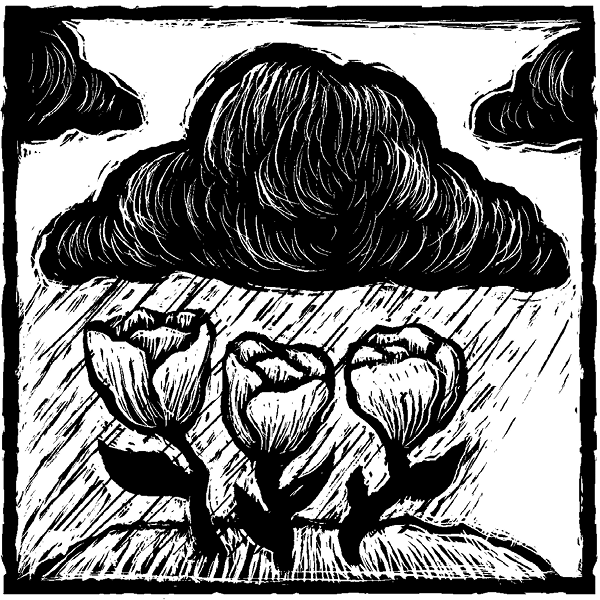Dallas Jennifer Cobb
If the only prayer you ever said was thank you, that would be enough.
—Meister Eckhart
Living a magical life, I have a lot of rituals, routines, and rites that help to shape my life, but of all the things I do to create and sustain a magical life, the practice of gratitude has probably been the one thing that has had the most profound and lasting effect.
The practice of gratitude is a finite and powerful form of magic that produces great results. Whether you use it to attract abundance and wealth, to call in your soul mate, to create a safe and happy environment, or to achieve your deepest desires, the practice of gratitude is something that can radically alter your life. And, if magic is the ability to change energy at will, then the practice of gratitude is pure magic, altering energy easily and fluidly and producing amazing results.
Last summer, during a particularly trying time in my life, I was searching for something to help me feel even a little better. A friend suggested writing a gratitude list, reminding me of the age-old proverb “Whatever we focus on grows.” And that was the beginning of my practice of gratitude. The simple list helped me to shift my bad feelings in the moment, turning my awareness to the good things in my life.
If magic is the ability to change energy at will, then the practice of gratitude is pure magic, altering energy easily and fluidly and producing amazing results.
Inspired by the instant effectiveness of this technique, I began to make a daily gratitude list, and also sought out information and resources on the subject. I learned a variety of techniques and practices that helped me to focus on and give thanks for the goodness in so many areas of my life. I found ways to cultivate gratitude for the wonders of nature, the blessings of the universe, the kindness of people, and the miracles of everyday life. These practices changed my perspective and focus, lifting me out of the worry, stress, and anger that surrounded the difficult situation I was working through and enabling me to feel happy, joyous, and well supported.
I learned quickly about the Law of Attraction, one of the universal laws derived from physics, which states, “Like attracts like.” If I was wallowing in fear, anger, victimhood, or self-pity, that was more likely what I would attract, but if I shifted my attention to gratitude for things both tangible and intangible, then I would in turn attract more of them. And that sounded good to me.
I expanded my practice of gratitude, trying many different forms. Some worked better than others, and these I made into regular practices. I want to share some of these and spread the magic and goodness around. Because everyone could use a little more magic in life.
The Research Says …
The practice of gratitude has been shown to shift body-based energy, eliciting an effect similar to the “relaxation response.” A wide variety of studies have been done on the topic, so if you are a “show me and I will believe” sort of person, here is some of the proof. If magic is the practice of changing energy at will, then the measurement of that change is proof of the magic at work.

Research has shown that meditation and prayer produce a relaxation response within the human body. Pulse and respiration rates lower, as do oxygen consumption rates and blood lactate levels.1 More recent research has shown that neural structures in the brain and nervous system are activated by meditation, prayer, and affirmation, specifically those structures that are involved in attention and control of the autonomic nervous system. More recent research into the effects of vibrational medicine documents the energy change that occurs within the body with the practice of gratitude and affirmation.2
Like meditation and prayer, the practice of gratitude has been shown to induce the relaxation response, reduce systolic blood pressure, and improve sleep quality. Studies have also shown that a person’s level of gratitude positively correlates to their level of vitality and energy, and the frequency of their gratitude practice positively correlates to their increased perception of well-being.3
What Experience Says
When I first started making simple gratitude lists, I was a bit of a doubter, but by the end of the first list, I was a believer. Turning my attention to what was working in my life, and away from the contemplation of my problems, actually made me feel better. My stomach relaxed, my headache lessened, and I felt a little shiver of excitement. Yes, I thought, there really is a lot of goodness surrounding me.
That increased awareness of the goodness that existed in my life energized me and gave me hope. I felt better physically and started to think about solutions rather than just problems. To anyone who has felt stressed, sick to their stomach, or plagued by a headache (either literally or figuratively), the cessation of the sick sensation comes as a delight.
Relieved by the reduction of the symptoms of stress, I decided that practicing gratitude was a solution to how overwhelmed I had been feeling. Everything in my body, my gut instinct, said that focusing on gratitude made me feel better physically, mentally, and emotionally. I was convinced.
Gratitude Basics
So what is gratitude, and how do you practice it? A quick quip will tell you that “gratitude is an attitude.” But let’s take a moment and consider what gratitude really is.
Growing up, we were all taught manners. We were taught to say please and thank you, expressing our desire and gratitude for what was provided to us. We didn’t take things for granted. As adults, these simple good manners are still useful in every situation, but the cultivated practice of gratitude moves us beyond common courtesy and into the realm of cultivating a state of mind and a way of life that is truly thankful for what we receive.
A practice of gratitude is the process of paying attention in the moment, noticing what is given to us, and uttering that one little prayer: Thank you.
Gratitude is the practice of consciously turning your attention to what is good in yourself, in your life, in your community, and in the world. It is the practice of saying thank you not just to people, but to the universe. A practice of gratitude is the process of paying attention in the moment, noticing what is given to us, and uttering that one little prayer: Thank you.
The Law of Attraction
Early on in my practice, I read a lot about the Law of Attraction. Sadly, much of what’s written these days is about financial abundance, and while I never turn down more money, the source of my problem was not money-based, so much of the literature didn’t quite hit the mark.
A friend facing a terminal illness shifted everything for me. He said he was grateful for his illness, which made him very aware of all the goodness he enjoyed every day. “Sunlight on my face feels like an exquisite gift,” he told me. That woke me up. Like the teenage saying “YOLO” (you only live once), I began to see each day as a gift—one for which I could choose how I would experience it. I could remain mired in problems and complaints, or, like my friend who was facing death, I could be grateful for each small blessing.
I started paying more attention and thanking people who gave me something lovely. I remember my daughter’s surprised face when I thanked her for hugging me in the morning. And I can still see the shocked face of the cook who stood behind the food service area in the big hotel dining room. I caught her eye and said, “Thank you. It is so nice to have breakfast made for me.” She laughed, leaned toward me, and said, “No one’s ever thanked me before. And I’ve worked here for nine years. You made my day.” We both walked away from the exchange smiling.
There are so many places to express our gratitude, especially for things that often go unthanked: people in invisible positions (like the cook) who serve me daily, the garbage collector, the traffic cop, the person at the drive-through window, and the cashier in the grocery store. I thank them when I see them, or give thanks for them when I don’t see them. My gratitude keeps me aware of all they do that contributes to my life.
Daily Tools
I use several daily tools to cultivate gratitude. Each has its own effect. I use a morning moment to focus myself for the day, in-the-moment awareness to cultivate gratitude minute by minute, and pre-blessing practice to shape upcoming situations. And I count my blessings at the end of the day.
When I wake up in the morning, I stretch and give thanks: I’m grateful to be awake and refreshed, and happy to be alive and healthy. I’m filled with gratitude for a new day in which everything is possible. This moment helps to set my internal tone for the day. I’m focused on the good, and open to the infinite possibilities the day holds.
Minute-by-minute gratitude requires awareness. It’s easy to remember when good things happen, but the more I use this technique, the more I find gratitude in most minutes of the day. Whatever the situation I find myself in, it is easy to find something about it to give thanks for. I’m grateful for this food I’m eating, and thankful to live in an area rich in agriculture and blessed by an abundance of fresh, local, and healthy food. Thank you for foods that are good for me and taste good.
When I have stressful, worrisome, or difficult situations scheduled for the day ahead, I take time to pre-bless the situation before I enter into it. Say, for example, that I have a dental appointment in the afternoon. I am anxious about the dentist, so rather than succumb entirely to the anxiety, aggravating my nervous system and causing more internalized stress, I use a gratitude practice to pre-bless the situation. In as much detail as possible, I envision myself leaving home, traveling joyfully and safely in the car, and arriving at the dentist’s office a little early and at ease. I see myself in the dentist’s chair and envision his smiling face looking down at me. The dentist is saying, “Your teeth look great! Let’s just do a little polish and you’ll be all done.” In the greatest amount of detail possible, I walk myself through the situation in my mind, and invoke good outcomes to the situation, pre-blessing it before it happens.
Before sleeping at night, I count my blessings. I make note of every lovely, unexpected thing that happened to me during the day, such as money found, checks received in the mail, sweet greetings and compliments from people, joy and laughter experienced throughout the day, and even the occurrence of beauty and nature. By writing down what I am grateful for, thankful for, and blessed by, I make lists of all the goodness I experienced throughout the day. I see tangibly how rich I am.
Gratitude in Tough Times
Sure, it’s easy to be grateful when the going is good, but what about practicing gratitude in hard times, with difficult people, or during a crisis?

A family member of mine died suddenly last year, which resulted in waves of chaos and grief washing throughout the extended family. I found it very stressful—not just the event and the fallout, but having to replay the emotions over and over as people processed their reactions.
We know through the Law of Attraction that bad feelings beget more bad feelings, so in order to survive the family gatherings, the funeral home visitation, and the funeral, I needed to find a way to shift the energy that surrounded the situation. And gratitude helped me to do this.
Oh sure, you say, what is there to be grateful for about death? And that was what I asked of the situation: What is there to be grateful for? I found many things.
Before he died, my brother-in-law spent an evening telling funny stories with his brother. They hung out in the “man cave,” watched a hockey game, ate stinky cheese, farted, and told funny stories. His brother stayed the night, and they shared coffee and breakfast in the morning. Two hours later, my brother-in-law had chest pain, called 911, coded out in the ambulance, and, after almost two hours spent trying to revive him, was pronounced dead.
Where is the gratitude in this?
I am grateful that my brother-in-law’s last day was filled with sibling love, that he was not alone despite his spouse being away overnight. I am thankful that he laughed and told stories and enjoyed good food and company. And most of all, I am glad that he went quickly and wasn’t left to linger in a severely disabled state. He died quickly, after a loving visit. And for this, I am truly grateful.
Even in the most difficult situations, we can always find something to be thankful for, if we look for it. Gratitude is an attitude, but one we have to learn to cultivate.
Living in Gratitude
Gratitude has a miraculous effect on our lives, manifesting and attracting more goodness, and alchemically altering us in the realms of physical, emotional, mental, and social reality. By employing the Law of Attraction, practicing gratitude can actually help to draw more goodness to us, as like attracts like, and good will attracts good.
By cultivating awareness, we begin noticing what we receive, and through the expression of thanks, we welcome more of that person, place, thing, or experience to our lives.
Resources on Gratitude
You can read about the latest research on the effects of gratitude in the books Thanks! How the New Science of Gratitude Can Make You Happier, by Robert Emmons (Jossey-Bass, 2013), and Living Life as a Thank You: The Transformative Power of Daily Gratitude, by Nina Lesowitz (Viva Editions, 2009).
For help and inspiration to develop your own gratitude practice, I recommend The Magic, by Rhonda Byrne (Atria Books, 2012).
Or maybe you want a phone app to make a gratitude list on the go. Happytapper.com has a variety of apps designed for just this purpose, including an app for gratitude journaling, an app for creating a vision board, and even an app full of inspirational quotes to uplift you when you need it.
There are tons of gratitude resources available, but the easiest and cheapest of them all is that simple prayer: Thank you.
Notes
1. R. Jevning, R. K. Wallace, and M. Beidebach, “The Physiology of Meditation: A Review,” Neuroscience & Biobehavioral Reviews 16 (1992): 415.
2. Dr. Richard Gerber, Vibrational Medicine (Rochester, VT: Bear & Co., 2001), pp. 39–44.
3. R. Emmons and M. McCulloch, “Counting Blessings Versus Burdens,” Journal of Personality and Social Psychology vol. 84, no. 2 (2003): 377-99.
Dallas Jennifer Cobb practices gratitude magic, giving thanks for her magical life, happy and healthy family, meaningful and flexible work, and joyous life. She believes the Goddess will provide time, energy, wisdom, and money to accomplish all her deepest desires. She lives in paradise, in a waterfront village in rural Ontario, and chants: “Thank you, thank you, thank you.” Contact her at jennifer.cobb@live.com.
Illustrator: Bri Hermanson
